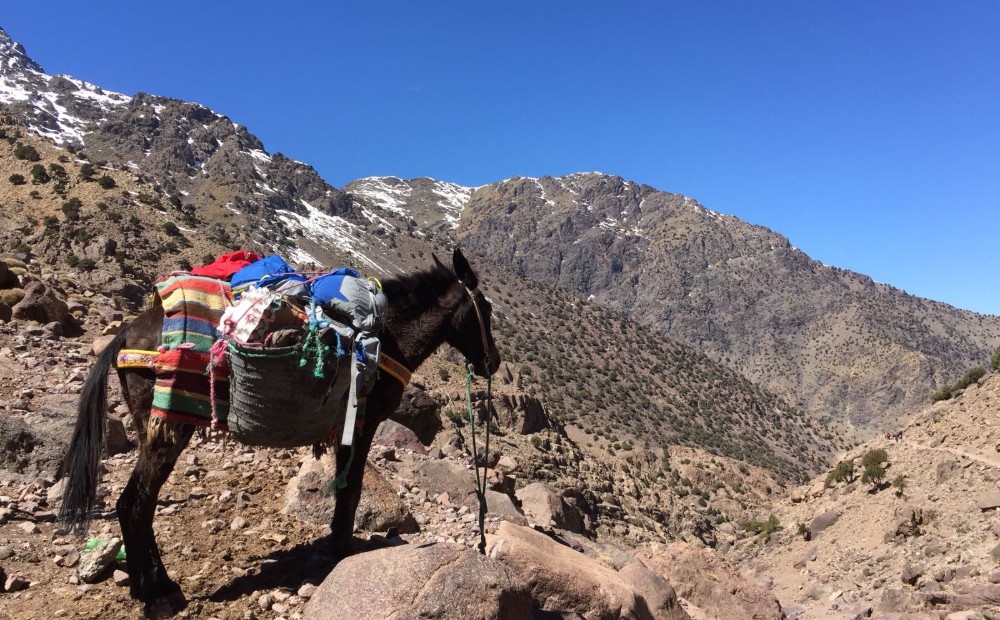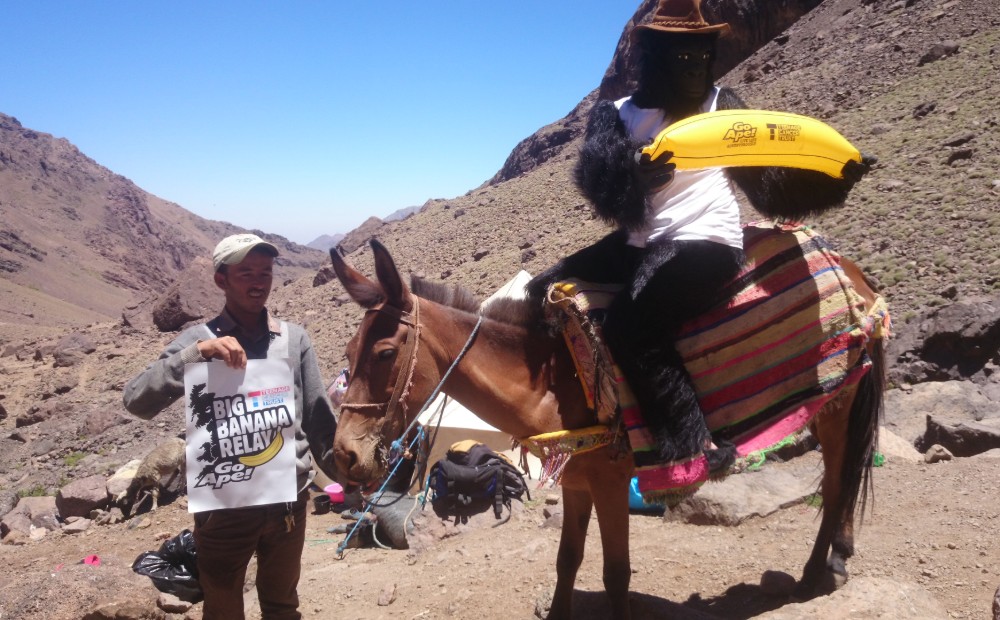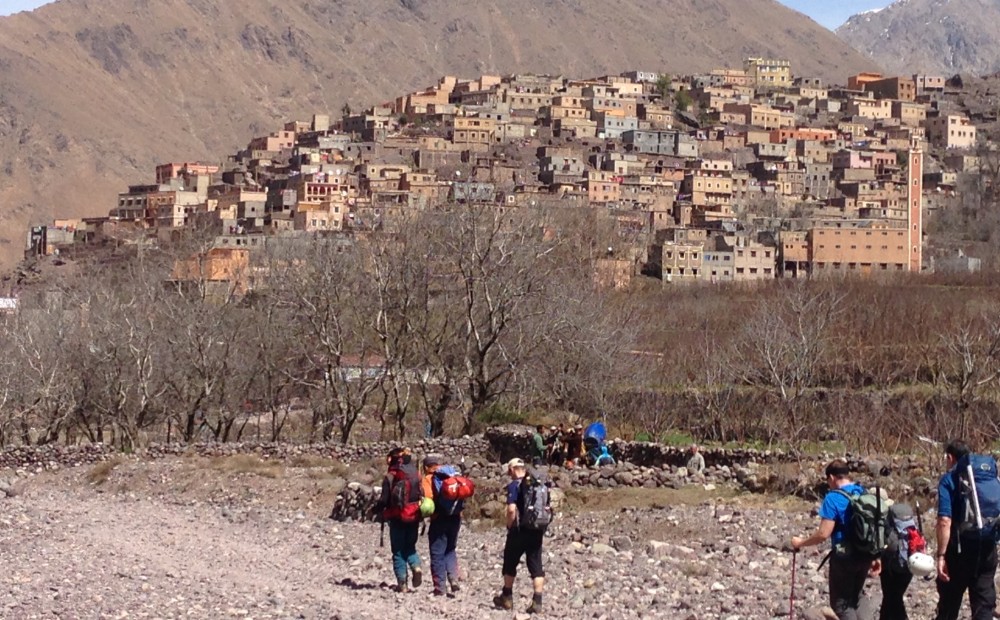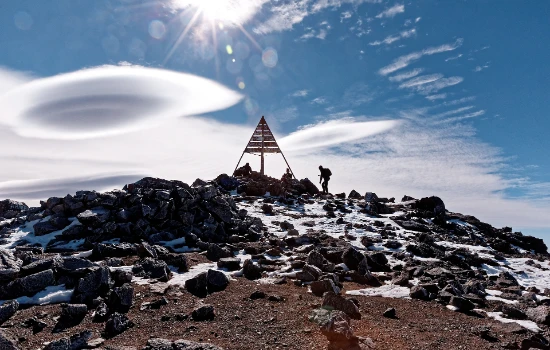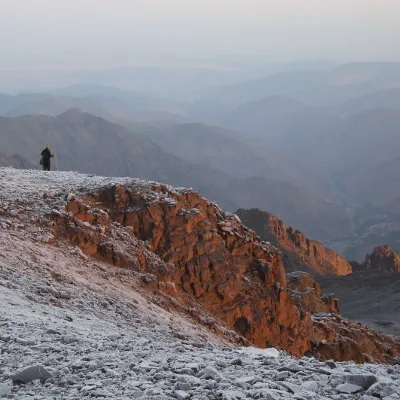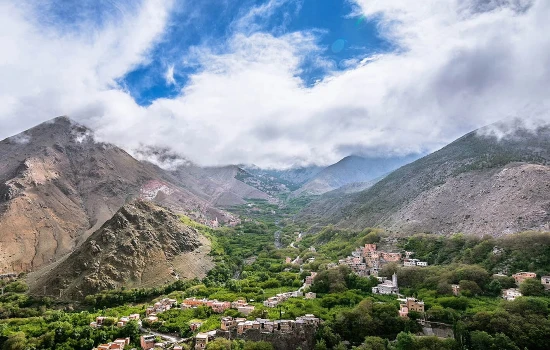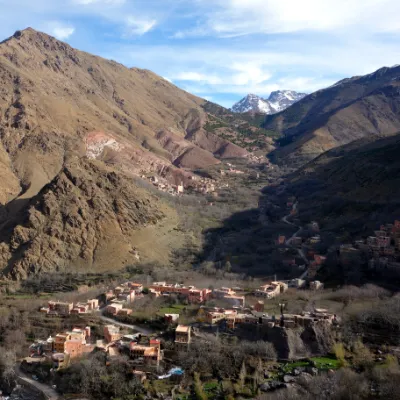
Mount toubkal long weekend trek - 4 Days
Tour snapshot
4 Days
Atlas Mountains - Morocco
173 € / per person
Learn more
Overview
Challenging long weekend conquering the highest peak in North Africa
The ascent of Mount Toubkal (4167m) is the highest peak in The Atlas Mountains and in North Africa. This trek is an energetic way to spend long weekend trekking holidays through the stunning High Atlas Mountains. With its wonderful variety of trails, Jaw-dropping scenery, magnificent high passes, dramatic peaks, and warm welcome from Berber.
The High Atlas Mountains of Morocco offer one of the most memorable places on the earth for Moroccan adventure trekking. It can be achievable during the summer months without specialist climbing skills. Most people who are reasonably fit and determined can achieve this goal and the views are magnificent over the Atlas Mountains.
What's Included
Group Pricing
| Participants Number | Price |
|---|---|
| 2 peopel | 223 € / per person |
| 3 to 6 peopel | 203 € / per person |
| 7 to 13 peopel | 173 € / per person |
Booking Form
From EU 173€ / Per personItinerary
Marrakech is the spiritual heart of Morocco, the cultural melting pot of the Mountain Berber and the desert people of the south, whose eclectic mix of ideas and traditions has resulted in a fascinating clash of color, noise, and visual delights that is straight out of the ‘Arabian Nights.
After being picked up from your accommodation in Marrakech at around 8:00 am, you will be transferred to Moulay Brahim Gorges onto the Berber town of Imlil (1750m). Imlil is situated on the upper foothills of the Western High Atlas Mountains, a natural paradise where trails set out in all directions. Here, we leave our vehicle and we meet our Mount Toubkal team for Berber tea before we start our trek heading along the Ait Mizane Valley towards the village of Armed. Build on a moraine spur overlooking the valley. Armed is the largest and the highest village in the Ait Mizane and provides an interesting mix of traditional terraced farming, Berber houses, and streets that seem to be permanently gridlocked by goats and cattle. Continuing east and crossing the floodplain, our route takes us along the mule tracks and up into the high rocky cliffs above the valley. Crossing the river, we eventually come to the pastoral shrine of Sidi Chamarouch, a famous place that attracts tourists and pilgrims. We then continue by zigzagging our way up to Toubkal Refuge (3207m), where we will spend the night. 5 or 6 hours walking.
Today starts with an early wake-up for breakfast around 4:30 am. The ascent will begin at 5:00 am in order to escape from the heat and being on the top at the best time. Through our hiking uphill, we will stop a few times for a short break to have some water, orange, and Moroccan nuts. Within 3-4 hours, you will be able to enjoy the magic views of Toubkal Summit and peaks over 4000m. Here, you will have the chance also to look at other valleys and Sahara directions. After that, we will descend down the same way to the Refuge after your admiration and meditation over the Atlas Mountains. After lunch, we will go back down to Imlil then transfer back to Marrakech. Approx 10 hours.
Depending on your flight time you may wish to enjoy a final stroll around Marrakech city before your transfer to the airport. The city has a number of highlights including Jardin Majorelle which was owned by fashion designer Yves Saint Laurent from the 1960s to his death in 2008. Ville Nouvelle is a cobalt-blue exterior that is surrounded by a delightful garden full of rare desert flora plus fuchsia bougainvillea and deep green palms. The result is an explosion of color nestled in the city. The Bahia Palace is a wonderful palace set in gardens and well worth a visit. Built-in the late 19th century, this beautiful building was reputed to be the greatest palace of its time.
Additional Informations
About The Trek
Mount Toubkal – Essential Info
At Mount Toubkal, the World we believe in, provides our clients with the best services and key to the enjoyment of any holiday in our opinion, it is the balanced and up-to-date information offered by the tour operator. We are confident that the items detailed below when taken in conjunction with a reputable and reliable guide book will enhance your Trekking experience as well as ensuring you receive the very best service from Mount Toubkal, the World in the Atlas Mountains of Morocco.
M-T : STAFF
It is important that our staff in our Mount Toubkal office have experienced the wonder of High Atlas Mountains Trekking and are able to answer many of your important questions.
Mohamed, for example, has trekked in the Toubkal and Berber regions and visited many of the places included on our hiking itineraries has also made it to the top of Jebel Toubkal – many of the photos on our web site were taken by him and his travelling companions on his various trips to the region.
M-T : GUIDES
All Mount Toubkal guides are fully licenced and are experienced from an early age in the Atlas Mountains areas, and guiding continues to be the heart and soul of who we are. We require that all of our guides undergo extensive safety training before officially joining us a mountain guide /or winter guide, local knowledge and guiding abilities. We believe that a local, licenced guide will offer more insight into the High Atlas region and Berber people as well as enhancing the local economy.
As well as a tip (see below) if you have had a great experience with your guide , you may wish to offer him something of yours that will assist his duties.
Please be guided by your guide’s expert advice on difficult or exposed paths and please respect the prayers of your guide and muleteers – they will usually do this outside of walking times so as not to interrupt your hiking.
M-T : MULETEERS & MULES & LUGGAGE
Your team of muleteers, along with mules, will vary in number depending upon the size of your group and whether you are camping or staying in guesthouse/refuge but they will all perform the same function which is to provide a full back up service for your hike, cook and prepare meals and set up the evening camp.
The mule team will load up your luggage, food and, if relevant, the camping equipment at the start of each day but will not always walk either at the same time, pace or route as your hiking party .So, it is important that you consider which items you may require to carry yourself in the morning and then again in the afternoon as on some days you may only meet up at lunch-time.
The mules are completely used to carrying the loads and it is not unusual for them to carry in excess of 80 kgs each which is equally balanced in two baskets. The muleteers take great care in both hygiene and presentation of your food and perform wonders with such limited conditions.
We recommend you take your trekking luggage in a large holdall or rucksack which can perhaps be folded up inside your main luggage if you are also travelling around Atlas Mountains and wish to have the security of your usual suitcase(s). You should also take a suitable day pack which will carry drinking water, camera, hat, raincoat, etc. as you may not be in direct contact with your support team at all times during the day.
WEATHER
In winter , much of the region above 2500m can be snow-covered and hiking in these areas could require the use of crampons and ice axes. High winds and precipitation in whatever form may preclude some routes and this will be discussed before you set out or can be modified at any time with the advice of your guide.
RAMADAN
We will maintain our programme of trekking during the holy month of Ramadan but we would ask you to respect your team by allowing them the courtesy of eating an early breakfast (before sunrise) and to avoid, where possible, drinking, smoking and snacking immediately in front of them during the day – they will of course prepare the usual lunch though as part of their duties.
WATER
It is important to drink lots of water during your hike; water can be purchased in Marrakech before you set off or in Imlil. It is also possible to obtain water from small kiosks in many villages and from the trailhead of Imi Ourghlad and at the Toubkal refuge. You will need to carry some of this by yourself but your mules will carry some more. Please , discuss with your guide the water requirements on a regular basis.
MEALS
Breakfast – tea, coffee,juice,fruit, milk, bread, butter, jam, cheese, porridge,
Picnic lunch – fresh Moroccan salad, cheese, slicing sausage, tinned tuna fish and sardines, bread, fruit, mint tea (pasta, beans, potatoes and rice can also be included).
Dinner – Soup,Tajine (chicken or mutton with vegetables), spaghetti, cous cous (main courses rotate depending on duration of trek .You are also more likely to get couscous on a Friday), bread, coffee, tea, cake, fruit.
* Vegetarians, vegans and those wit
CAMPING
Camping is an option if prefered (june-Octo).
We provide modern igloo-style tents that sleep two persons each; they are of various sizes so ideally we would like to be advised in advance if any of your party is particularly tall (6 ft or over). So that, we can provide the most suitable tents for all groups.
Along with the sleeping tents, we also provide one or more large traditional Berber tents for cooking, eating and socialising which make your camp a little bit special.
NB : If accommodation is required in the Atlas Mountains either before or after the trek, we can always book you at our Imlil Refuge or at our Riad Dar Bab Toubkal in Armed village.
REFUGE
The refuge is simple but offers warm showers, a few western toilets and a warm lounge with electric lighting in which to read or chat with your fellow hikers. There is a full kitchen for your team to cook in and a couple of dining areas. Please note that boots must not be worn in the refuge. So, sandals, shoes or flip flops should be taken to keep your feet (and socks) warm, dry and clean.
Clothing and Equipment
You should dress according to altitude and the environment you will be located in. Most treks are in high altitude climates in remote areas. Therefore, there are often large temperature swings. Temperatures are often colder at high altitudes.
Clothing for Trekking
• Trekking boots or light weight walking shoes. Having comfortable footwear is essential for a good trek. Make sure all footwear is broken in well prior to your trek. Do not break in boots on your trek,
• A track suit and a pair of track shoes to wear in the Berber tea house and camp at night,
• Two pairs of woolen socks for trekking shoes and track shoes,
• Warm down jacket and rain proof jacket with hood for protection from rain,
• Woolen hat for the cold and sun hat or cap for sunny days
• A pair of woolen gloves and a pair sandals to wear in Berber tea houses or camp,
• Two cotton T-shirts and two pairs of long shorts/skirts
• Woolen shirts and thick sweaters as well as wind and water proof trousers,
• Pair of light or heavy weight trouser and one light weight long sleeve shirt,
• Two pairs of thermal undergarments,
Equipments for Trekking
• Trekking or duffle bag to carry trekking gear. Mount Toubkal can provide a duffle bag for you to borrow during your trek. This will be returned after your trek,
• Trekking daypack for personal items such as water, snacks, extra layers and camera,
• Water purification tablet and bottles,
• Sleeping bag,
• Travel Pillow,
• sun glasses,
• walking poles,
• Small torch light or head lamp with spare batteries,
• Sun block,
• Lip balm with sunblock in it,
• handkerchief or wiping papers,
• Money belt,
• first-aid kit,
Trekking equipments are available at Imlil Center. Mount-Toubkal can recommend shops for you to purchase equipment. If you do not wish to buy equipment, you can easily hire or rent them for the duration of your trek with reasonable prices.
Similar Experiences



